Ellen and Jim Have a Blog, Too
We are two part-time academics. Ellen teaches in the English department and Jim in the IT program at George Mason University.


Pallisers 8:17: The array of male types across the series; the vexed nature of life potentially more dangerous than it appears (2) · 24 December 08
Dear Friends,
I’ve provided a transcript of a major scene from 8:17 and discussed Raven’s departure from Trollope in Phineas Redux when he leaves Phineas to seem perhaps really guilty of the murder. Now I turn to summarizing and commenting on the episodes.
There are a number of ways one can approach this task at this point—the series, now so long and intertwined, is so rich. The simplest is that 8:16 is preparatory to 8:17: 8:16 was another transition within the Phineas material introducing the newly configured Adelaide-Gerard Maule-Fawn story (Jo Kendall, Jeremy Clyde, Derek Jacobi) and focusing on Bonteen (Peter Sallis) as a lead-in to the accusation that Phineas (Donal McCann) murdered him. Part 8:17 brings the Phineas v Bonteen story to a climax in the arrest of Phineas for the murder of Bonteen, and brings the newly-configured Adelaide-Gerard Maule-Fawn story to a comic climax and first closure when Adelaide rejects Fawn in a funny proposal scene which recalls Elizabeth Bennet refusing Mr Collins in Austen’s Pride and Prejudice. Of all the substories, the Adelaide-Maule-Fawn one is the shortest. The two parts are closely interlinked as the part’s opening scene (just below) shows; they are a kind of diptych.
I’m beginning to think that instead of seeing these smaller stories as subplots related to the larger story of the novel they occur in (which is how Trollope handles them), one ought to see them as related to one another and across the whole series of films. We get a continuum or variety of young gentleman males who court women and whose roles dramatize the problems and choices of men getting through life with the burden of various social norms still operative today; to wit, to be respected as an adult male in society, one must be make or have good money, be ambitious, rise in the world, be a protector of females, and bring up a family in a father’s role. There are really an arrray of these subordinate types in the gentleman mode who are tested: Dolly Longestaffe (Donald Pickering) who will see himself as a rival to Silverbridge late in the seriers, Burgo Fitzgerald (Barry Justice), George Vavasour (Gary Watson), John Grey (Bernard Brown), Robert Kennedy (Derek Godfrey), Oswald Lord Chiltern (John Hallam), Frank Greystock (Martin Jarvis), Frederick Lord Fawn, Lord George de Bruce Caruthers (Terence Alexander), Gerard Maule, Ferdinand Lopez (Stuart Wilson), Frank Tregear (Jeremy Irons).
Lord Silverbridge’s (Anthony Andrews) conflict with his father, Planagenet (Philip Latham) as a central star makes his role something different; Phineas Finn (Donal McCann) is a secondary major player across the series and also carries other important themes. Interestingly, only Chiltern succeeds in achieving any stability before our eyes; Greystock may, but we don’t know this; he is not presented as a strong presence. Phineas does not have children after Mary (Maire Ni Ghrainne) and her baby die. Two central males, the old Duke of Omnium (Roland Culver) and the younger one, Plantagenet Palliser or Omnium are showing dealing with families, and they do this very stumblingly, with great difficulty, and without much inner understanding. Now in this part we have a long scene where the Prince of Wales (Edward Hardwicke) is presented as a drone of drones, behaves appallingly, and is applauded because forsooth he is royalty.
So instead of seeing the whole series as made up of 4 long novels and three novellas embedded inside, it’s perhaps better to see a long chain of intermingled continuity. The soap opera aesthetic is the truer one to the series. Inside the part too, a soap opera aesthetic is the useful one for making aesthetic sense of the hour. There are various inferences or themes which unite the disparate threads, for this is not a 15 minute or half-an hour part, but an hour long one, a space of time sufficient to demand an aesthetic sense of internal coherence as well as closure at its end.
One I find in all of the scenes of 8:17 is the inference the vexed nature of life is potentially more dangerous than it appears. 8:16 showed quiet worry, Chekhovian regret, discomfort and melancholy playfulness; in 8:17 things have ratcheted up to vexation, and while it may seem harmless (say in the Adelaide-Maule-Fawn story and family quarrels), real feelings are involved and people’s real fates: Adelaide is not just a figure of fun, and needs a income and decent husband, nor is Fawn harmless. Characters have expenses: the Bonteens (June Whitfield as Mrs) are spending for Lady Eustace (Sarah Badel); Emilius (Anthony Ainley) wants money; the problem of trade is supposed to affect “the country.” Anger simmers until it boils over into murder.
Episode 41: “Making amends.” A series of 6 swiftly moving scenes where we come upon characters (as it were) in medias res. Scene 1) The Club. As often happens in these mini-series, the scene’s dialogue is so written that we are asked to remember a previous scene (8:16 Episode 40, “Position Denied,” Scene 18, The board room where the Prime Minister agreed not to give the Exechequer to Bonteen after all). We are also to imagine the scene that went on inbetween or offstage and is not dramatized in the film. Trollope had given the scene between the two Dukes (Roger Livesey as St Bungay) and Gresham (Robin Bailey) in two telling sentences (1983 Oxford World Classics PR, II, Ch 40, “The Prime Minister is Hard Pressed,” pp. 357-58), instead choosing to half-dramatize the scene between Gresham and Bonteen by free indirect speech (II, Ch 40, pp. 360-62). Trollope shows Gresham trying to let Bonteen down easily, offering the Board of Trade as a substitute and Bonteen becoming very hurt:
“At last Mr. Bonteen was absolutely told that he could not be Chancellor of the Exchequer. If he would consent to give his very valuable services to the country with the view of carrying through Parliament the great measure of decimal coinage he should be President of the Board of Trade,—but without a seat in the Cabinet. He would thus become the Right Honourable Bonteen, which, no doubt, would be a great thing for him,—and, not busy in the Cabinet, must be able to devote his time exclusively to the great measure above named. What was to become of ‘Trade’ generally, was not specially explained; but, as we all know, there would be a Vice-President to attend to details.
The proposition very nearly broke the man’s heart. With a voice stopped by agitation; with anger flashing from his eyes, almost in a convulsion of mixed feelings, he reminded his chief of what had been said about his appointment in the House. Mr. Gresham had already absolutely defended it. After that did Mr. Gresham mean to withdraw a promise that had so formally been made? But Mr. Gresham was not to be caught in that way. He had made no promise;—had not even stated to the House that such appointment was to be made. A very improper question had been asked as to a rumour … ”
Raven (8:16, Episode 40) had dramatized the hard-ball scene between the two Dukes and Gresham at length, and now presents a much harder meaner scene. At first Barrington Erle (Moray Watson) simply stonewalls an outraged Boneen who opens the dialogue belligerently with “Well, Erle what have you to say?” Erle is under no obligation to say anything (unlike Gresham would be):
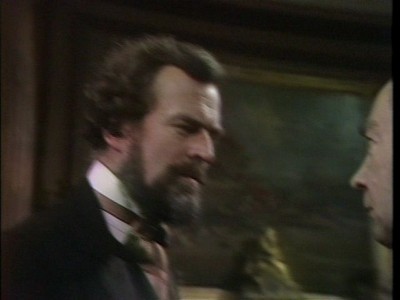
Erle stonewalls Bonteen.
And he at first refuses to say anything, suggests Bonteen go to the prime minister; Bonteen’s been there (“He was very cool, Mr Erle, very cool …”), and was told how there was no promise made, to which Erle replies, “Well that’s about it, isn’t it?” Then Bonteen with whispered intensity insists he’s being treated badly: “Come, sir,I will not be made a fool of.” Sallis’s voice chokes up, and we feel tears coming to his face, which becomes angular and sharp as he endures Erle’s needling reply he “made a fool of himself”[ at the Duchess’s dinner party]. Bonteen’s seething reply referring the (unmentioned) Duchess shows he now realizes how he was set up and off-stage understood the treachery performed on him, and he begins to utter insulting terms for Finn. (Again 8:17 is closely linked to 8:16.)
Raven’s changeover not only makes for high drama of a felt near-physical clash, and shows how the Duchess’s plot is boomeranging on Phineas; it fits Raven’s theme (not Trollope’s as I’ve said) in his development of Bonteen somewhat sympathetically: how easily someone on the fringe of power is thrown over carelessly when need be (a theme central to Raven’s novel, Fielding Gray). As the part moves on, we see Barrington who was hitherto seen with Bonteen warning Phineas, half-insulting Phineas, jealous of Phineas, now turn to stone to Bonteen, and make half-apologetic gestures to Phineas, and act as Phineas’s friend and advisor. Erle is again Everyman, and as Finn’s stock goes up, so Erle becomes his friend, with Dolly Longestaffe offering the cynic’s reading, and occasional humane or amused utterances as long as these cost him nothing.
Scene 2) Parliament. Now we come in upon Phineas giving a brilliant speech, something we have been Phineas valued for earlier: 4:8, Episode 40. In Phineas Finn, Trollope’s hero is said to have been good at forensics at Trinity. The establishment shot is of Gresham and Erle watching and then the camera cuts to Phineas’s self-deprecating reasoning.
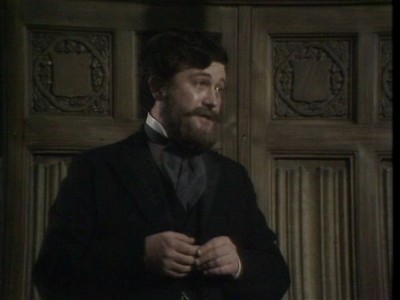
Phineas an effective speaker on behalf of his partty.
The matter is a transposition or transference to Phineas Finn from speeches given the two Prime Ministers (Daubeny and Gresham) of Phineas Redux, I, Chs 33 (pp. 299-302; also found in I, Ch 8, “The Address,” pp. 71-75); using free indirect speech Trollope presented Gresham’s argument that the liberal party would not support disestablishment at Tory hands because the bill was a front to keep the Tories in power, not something they wanted or would take care would be done right. Raven’s Phineas makes this argument and downright accuses the Tories across the way of hypocrisy, which makes some of them leave. The camera now shows us Bonteen in the background having to see his opponent’s talent so useful to the party and the scene ends on the pleased party members congratulating themselves:
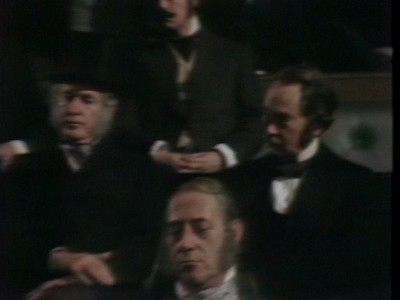
Bonteen on upper bench watching Phineas perform.
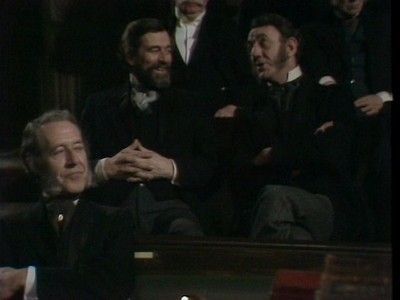
Prime Minister (Robin Bailey), Erle and Monk (Bryan Pringle) gratified and feel they are winning through Phineas’s speech.
It’s a toss-up who’s making the amends here: Erle and the party to Phineas, or Phineas to the party for his defections over Irish Tenant Right (which the party has since passed) and allowing his principled stand on disestablishment to be used to re-elect him at Tankerville in order (as we see in the novel) to deflect prejudice against himself as a Roman Catholic (I, Ch 4, pp. 34-37). (Sincere or serious film adaptations work best when the viewer has read the book.)
Scene 3) The Bonteen front room. Raven is still taking his material for all these scenes of the Bonteens from the one chapter PR, II, Ch 45, “Some passages from the life of Mr Emilius”. Mrs Bonteen and Lizzie Eustace wait up for Mr Bonteen, and when he comes in, cater to his every need, and there are intense undercurrents of sexual interaction between Bonteen and Lizzie, as when she lights his cigar:
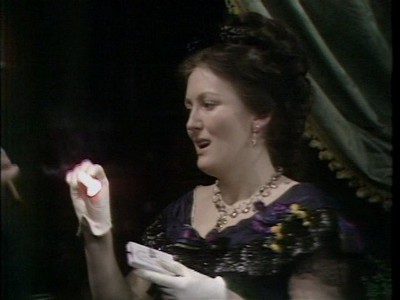
Lizzie (Sarah Badel) lights Bonteen’s cigar
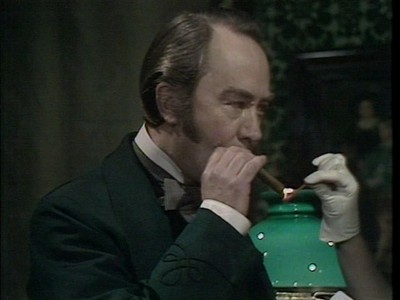
Bonteen responds.
He does justice to Finn’s speech, but avers that “as long as I have any say in the matter there’ll be no promotion for Finn,” and says now he has some free time to go to Prague to find evidence Mr Emilius has a former wife alive there. Lizzie is all gratitude.
Scene 4) The Palliser front room, Marie and the Duchess communing over the full-text reports of Phineas’s speech. The Duchess (Susan Hampshire) tells Marie (Barbara Murray) the powerful men are “all very pleased with him,” but “will do nothing” for him because of the rumors about Lady Laura Kennedy (Anna Massey) and the party’s need of Bonteen. A newsy linking scene where the women also report Bonteen has gone to Prague and the Duchess leaves for a while because she must “go shopping” with “the boys” for the coming term at Eton. Yet another function is to present Phineas as “angry” with the Duchess, to which the bothered Duchess says, “But why I did my best for him,” and to show Marie only half-listening so absorbed is she in Phineas’s words.
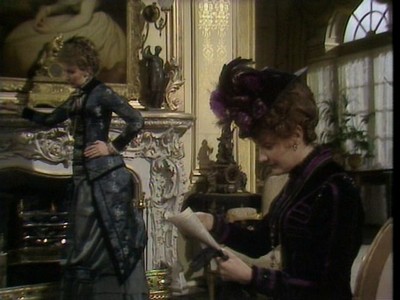
The Duchess feels Phineas unfair, and Marie can’t keep her mind away from Phineas’s words.
This part of the scene is a dramatization and transposition of a scene between Marie and Finn in the novel where she tells him what the Duchess has been doing for him, and he is angered at the thought he is supported by women and this has gone against him, and perhaps created more prejudice (PR, I, Ch 37, pp. 331-33).
Scene 5) Omnium’s study. He and Erle going over bad situation over trade. Erle says Bonteen has been going around saying he’s been “shamefully treated by a group of high-handed aristocrats.” This is an inference from Trollope’s statements about how Bonteen could not control his anger after the loss of the Exechequer without specifying further (e.g. PR, II, Ch 43, “The Second Thunderbolt,” p. 23). The other part of the content is wholly invented: the Duke confides that Legge Wilson’s decision to tax imports has made the trade situation worse (Raven inserts a conservative free trade position for 20th century times). The Duke affects to laugh at Bonteen’s bad-mouthing, but he worries that the new Exchequer has given “another very solid complaint for the People’s Banner to exploit on [Bonteen’s] behalf.” Trollope tells us Slide spreads propaganda on behalf of Bonteen but not that there is anything solid behind it (PR, II, Ch 43, p. 20).
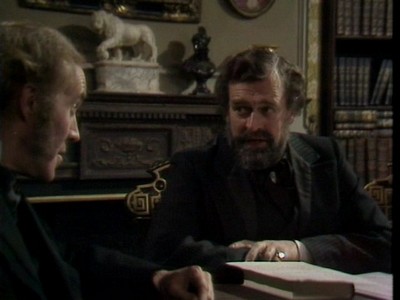
Duke & Erle worrying about trade, rumors spread by People’s Banner which have some solid information,
Scene 6) Palliser front room with Adelaide and Maule. A stylized comic scene where first we see the couple from the back and then front and then leaning towards and away from each other while they warm themselves by the fireplace after their ride.
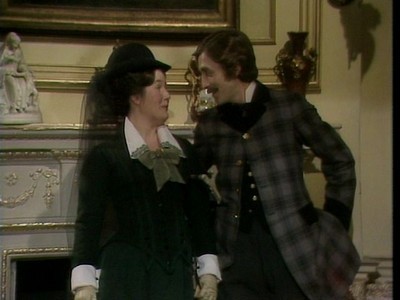
Restoration stylized comedy, pastoral, Adelaide (Jo Kendall) and Gerald Maule (Jeremy Clyde)
The sparring and flirting is wholly invented; in Trollope’s novel, Maule is confronted by Chiltern who demands he be serious or take himself off; Adelaide and he exchange letters; their riding together occurs offstage earlier in the novel and any aftermath alone is offstage; in the novel we see Lady Chiltern and Adelaide discussing Adelaide and Maule’s relationship at Harrington Hall. Raven’s Duchess replaces Lady Chiltern (Mel Martin). However, the sentiments of the scene are in the spirit of a typical Trollope’s male who is unwilling to give up his pleasures and gentleman’s existence at cheap rate in order to marry and also the typical female who wants him to marry and is (like Adelaide) badly hurt:
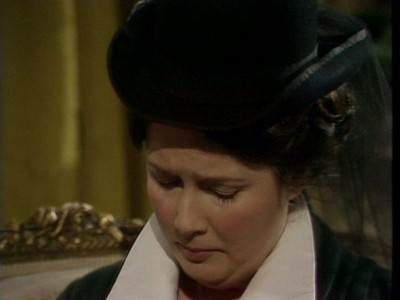
Serious emotions and Adelaide’s future involved.
(From the scene): Adelaide. “That sounds selfish and spiritless … You’re laughing at me, Mr Maule …. [gets up and walks away] Then you have a small mind …”
The Duchess comes in and interrupts the tete-a-tete; Maule escapes, only conceding by agreeing to ride with Adelaide next “Tuesday morning at eight.”
Episode 42: “Family Quarrel.” Rhythm changes and we have 2 long scenes (I count scenes as all the action which occurs in one place without any switch to another place) with one brief coda scene to the first. Scene 6 still): Still the front room, Palliser apartment house in London. As Maule goes out the door, the Duchess questions Adelaide, with a “how do you find him;” Adelaide’s answer is “slippery.” The Duchess takes her over to the couch to argue on behalf of Fawn who is not slippery, but Adelaide doesn’t want him, and for the first time we get a whiff of Trollope’s stronger character when Adelaide asserts “everyone will respect me whatever I do” (i.e., she need not marry). They are interrupted as Collingwood (Maurice Quick) comes in with teatray and boys, Silverbridge and Gerald (Roderick and Barnaby Shaw), then the Duke and Marie, and the strained family quarrel ensues. For details see transcript.
A summary: The family sits down to tea: Adelaide, Madame Max (now exquisite in a sheer Laura Ashley dark purple costume), Duchess, boys. Father rushes in. All jolly until father forgotten by boys as they invite mother and cousin to coming game at Eton, suddenly glowering says he is very disturbed by Silverbridge’s lack of academic achievement. We could be at dinner in any 20th century family home.
The boys bristle and it emerges quickly they have tried to see him, and talk with him, but he is always too busy. The Duke becomes insulted and and starts to repeat his mantra about Silverbridge’s lackluster academic performance, and says they should have tried harder to get into the room. How could they? The boys say this and present his father as he really is, and the Duke’s instinctive response is to become arrogant, intense, domineering and demand an apology for the accusation (not made) of discourtesy. Silverbridge won’t until his mother asks him to for her. For her he will. Madame Max then congratulates him upon apologizing to everyone. That won’t do. The Duke demands humiliation before him (an apology is a form of humiliating yourself). Silverbridge concedes it. Then intense, shaking, the Duke apologizes in turn for being too busy, and promises to come to the match after spending more time with boys.
Silverbridge remains calm for the whole scene (only allowing himself a statement that he “refuses to be bullied even by you”) and his behavior makes him the real “winner” of the confrontation. He will not find winning so easy when he grows up and the issues become his moral conduct.
Scene 7) Coda to scene 6. Inside the carriage. The boys get in, an affectionate Duchess there, saying goodbye, handing them little sacks of money, herself again half-forgetting what the game she is to come to is about, only she’ll be there. They ride off and the boys talk. Silverbridge got more than Gerald as he’s the older son, and Gerald says it was the same proportion of smaller sums from Madame Goesler. The father did not give them anything, as he “leaves all that to mother.” Gerald says father was “horrid” at tea, but then acted “like a brick.” Silverbridge is not so sure: “I don’t think he’s forgiven me,” and as for Gerald’s idea that the father became “handsome” and “made it all right,” Silverbridge says: “He made it all right .. until the next time.” We later learn the father did not come to the game.
Scene 8) The Bonteen’s front room. Phase 1: Mr Bonteen comes in to a waiting Mrs Bonteen and Lizzie Eustace. He informs them that Phineas spoke and admits honestly that he spoke well; he then proceeds to tell what he learned while in Prague: that a man named Joseph Mealyus married a woman 15 years ago in a synagogue, and took her to Prague where he left her 8 years back; he had not managed to see her, for Emilius got there first, hid her away, but the problem is also one must prove that Emilius and Mealyus are the same man. Lizzie says she will bear the cost as it will be less than supporting him. From PR, II, Ch 43, pp 41-2 (the story of Bonteen’s trip and what he found out told by narrator). Before he retreats to his study and letters and other work (the business of trade is going wrong he feels instinctively), half-embarrassed Mr Bonteen gives Lizzie a schedule of costs she must pay him for.
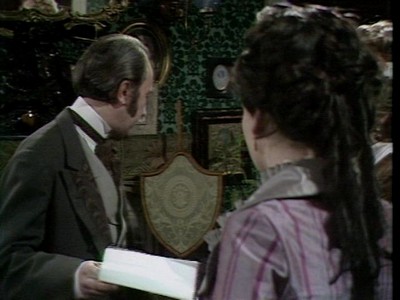
Bonteen handing Lizzie the bill.
Phase 2. Mrs Bonteen presses Lizzie to pay her 50 pounds for household expenses, and Lizzie agrees to 25 now and 25 at the end of the week. The implied threat is Mr Bonteen will find it too much to keep this up as he had so much on his mind. A free extrapolation from Trollope’s comment on Bonteen that not long after he came back from Prague, he became sick of Lizzie Eustace as Mrs Bonteen of her “constant kisses” (Ch 43, pp. 43, 47)
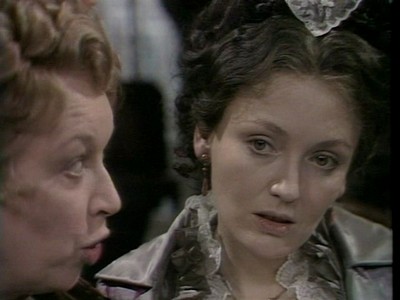
Lizzie realizes she has to pay for more than Mr Bonteen’s bill.
Phase 3. Mr Bonteen comes out in a hurry to go to office to find out what’s happening over trade. Some of the language comes straight from Ch 43, p. 45. Trollope’s Bonteen: “A clique of stupid women to take up the cudgels for a coal-heaving sort of fellow like that …”; Raven’s Bonteen: “Doubtless the Duchess and her clique have been busy advancing the cause of that infernal Irish coal-heaver” (omits anti-women talk). He is interrupted by a servant girl, Hollins (Veronica Doran) come to say a “clerical gentleman, Mr Emilius” “has come to see his wife,” the two women become frightened and distress, he ushers them hurriedly into his study, and prepares to confront Emilius, he takes a gulp of drink, looks old standing by fireplace. Phase 4: Emilius enters, aggressively seeking his wife (he has every right to do this). This is a dramatization of II, Ch 43, pp. 41-42:
“Mr. Emilius made no attempt to obtain the person of his wife while she was under Mr. Bonteen’s custody, but he did renew his offer to compromise. If the estate could not afford to give him the two thousand a year which he had first demanded, he would take fifteen hundred. He explained all this personally to Mr. Bonteen, who condescended to see him. He was very eager to make Mr. Bonteen understand how bad even then would be his condition. Mr. Bonteen was, of course, aware that he would have to pay very heavily for insuring his wife’s life. He was piteous, argumentative, and at first gentle; but when Mr. Bonteen somewhat rashly told him that the evidence of a former marriage and of the present existence of the former wife would certainly be forthcoming, he defied Mr. Bonteen and his evidence,—and swore that if his claims were not satisfied, he would make use of the power which the English law gave him for the recovery of his wife’s person. And as to her property,—it was his, not hers. From this time forward if she wanted to separate herself from him she must ask him for an allowance.”
Raven picks up motives and captures them in brief supercharged dramatic language, with Emilius not piteous, argumentative or gentle, but first implictly relying on his right to see his wife, then supposedly reasonable demands for part of the rent from Portray, and at last nervously moving into a fierce anger after which he leaves smiling; Bonteen tells him to seek his wife in Prague. Along with the scene in 8:16 where we see Emilius turn his cravat into a sort of tourniquet for strangling Lizzie, this scene brings out the reality of Emilius’s anger and is the closest Raven comes to telling us it’s Emilius who killed Bonteen, e.g.,
Mr Bonteen. “You shall go off quietly, sir, and you shall have nothing and before long you shall be punished as you deserve.”
Emilius. (quiet tone and face). “Punished, sir?”
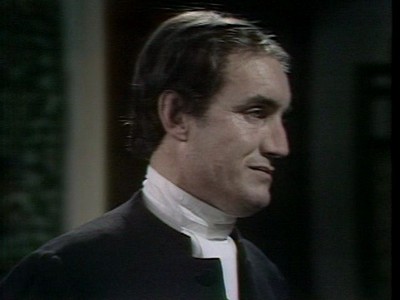
Emilius looking at Bonteen as Bonteen says he, Emilius, will be punished.
Here we see how dangerous apparently banal family quarrels are. I’ll break the summaries here as this is long enough and there is a change of mood and rhythm in the next episode.
Ellen
See various links and a concise summary of 1:1-3:6, 4:7, 4:8, 5:9, 5:10, 6:11, 6:12, 7:13, 7:14; 8:15, 31-33, 8:15, 34-35; 8:16, 36-38, and 8:16, 39-40
--
Posted by: Ellen
* * *
Comment
- A friend wrote:
“It seems as if there are loads of classic movie blogs out there but no costume drama ones, except for you and me – but I’m getting about the same number of readers for both blogs, whatever that shows …”
To which I replied:
“On just the issue of costume drama: they are as good or better than these classic films. I really think prejudice against them as elite is what stops people. Other things: they are seen as soap opera, are often TV, and are based on classic books which again put larger numbers of people off. A lot of people hate school, for me I loved it when I was very young and again when I was in college and graduate school. Finally they are seen as conservative so the “high culture” types stay away and the prejudice books must be better. That’s an awful lot of negatives and that they are like, and are good can only be shown by saying that despite all this, despite the cost, despite the small profits in comparison to pop, they keep on being made.
E.M.”
— Elinor Dec 27, 8:49pm #
commenting closed for this article
